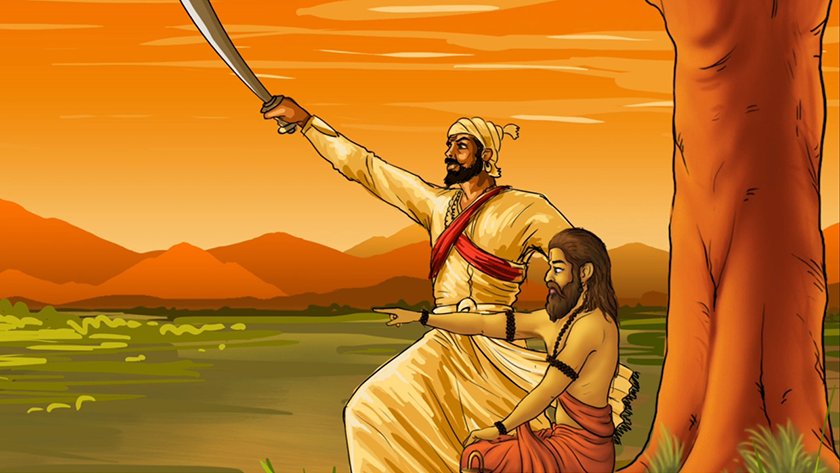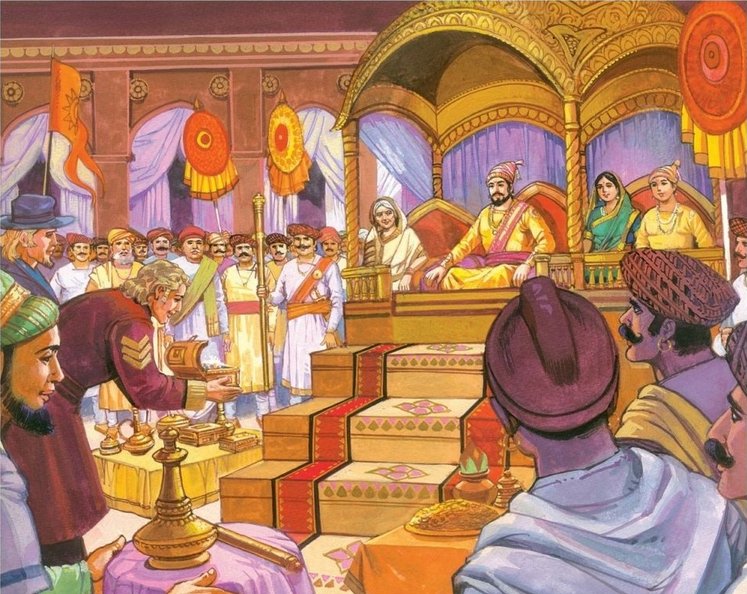If there was anyone in 17th century Hindu society who stood up firmly and dared to challenge its defeatist mentality, it was none other than Chhatrapati Shivaji Maharaj. – Vinay Sahasrabuddhe
June 6 marked the 350th anniversary of the coronation of Chhatrapati Shivaji Maharaj, a visionary king known for his valour, exceptional administrative abilities and insightful strategies. Sadly, during the British era, colonial rulers deliberately ignored the greatness of Shivaji—a source of great inspiration for numerous freedom fighters and, in a larger context, one who can be counted as one of the nation’s earliest freedom fighters. Post independence, too, the apathy towards the Chhatrapati’s legacy continued, partly for the sake of politics.
Besides the indisputable fact that Shivaji’s contribution is too great to be ignored, we must remember him for multiple reasons. He was an ideal leader known for his farsighted vision, emphasis on inclusiveness, sharpness of mind, as well as strategic thinking and diplomatic approach.
The historical impact of the struggle he faced was neither confined to Maharashtra alone, nor to just one century. Its influence persisted for centuries and will continue for many more ages to come. Generally, Chhatrapati Shivaji is remembered for his bravery and valour. But beyond these attributes, one must also take into account numerous transformations he shaped during his lifetime in 17th century society. Many historians describe him as a revolutionary leader who initiated five major revolutions that are truly worth understanding. These are the farm revolution, economic revolution, social revolution, military revolution and most important, a cultural revolution.
When Shivaji Maharaj and Rajmata Jijabai arrived in Pune, the region had faced severe devastation under the Adilshahi rule. When Rajmata arrived with the young Shivaji, she symbolically got the land around Pune ploughed with a golden plough. This was more than just a gesture. The duo symbolically extended the message to peasants and cultivators to cultivate their land without any fear or apprehensions. In a land considered cursed and in a society that had forgotten how to aspire, Shivaji’s golden plough removed a feeling of helplessness and revitalised the fertility of the land. With this, he conveyed to his own countrymen: “No need to worry now. I am here for you.” This singularly important act sowed the seeds of hope, confidence and resoluteness.
This was supremely important as under the Adilshahi rule, farmers had to pay 60 percent tax, causing great distress. Add to this the unspeakable tyranny of natural and man-made calamities, making it hard to dare cultivate one’s own lands. Historical records indicate that only 30 to 40 percent of the land was under cultivation. To incentivise cultivators, Chhatrapati Shivaji’s administration started free ration, up to two measures (khandi) of grains to every cultivating farmer, besides free supply of seeds and farm equipment. He abolished tax for the first five years. Within five years, the situation improved so much that almost a 100 percent of cultivable land was brought under cultivation. Later, in the sixth year, he charged them 33 percent levy to be deposited in kind, in state granary. Thanks to his imaginative thinking and sensitive approach, farming became attractive and farmers, prosperous.
The prosperity of farmers had a cascading effect as it led to the economic well-being of all those previously known as the ‘12 balutedars’, whom we now refer to as traditional artisans and craftsmen. With economic stability of farmers restored, their unending demand for tools, equipment and implements triggered rural manufacturing, which provided work for blacksmiths, carpenters and cobblers, among others. This was a kind of economic revolution as it opened up several livelihood opportunities for many.
This gave way to a kind of social revolution too. When society at large—otherwise fragmented in innumerable caste and community groups—realised they can very well depend upon the rule of Chhatrapati Shivaji Maharaj, aspire a better life and an assured law and order, it led to the restoration of popular confidence in administration. Over 18 different castes belonging to agro-based labour and craftsmanship felt empowered to attain prosperity and prestige. This led to the formation of the Mavalas (soldiers of Shivaji), a socially integrated army of committed soldiers. Without any formal recruitment, this ever-ready army was largely spontaneous and yet organised. Whenever a battle loomed, everyone would leave their work and answer to Chhatrapati Shivaji Maharaj’s call with a sense of duty. This was unparalleled.
Chhatrapati Shivaji had to fight innumerable uneven battles. His army of few hundred brave soldiers always had to confront the might of several thousand soldiers of the Mughals. An insightful field-martial, Shivaji often resorted to the guerrilla tactics of warfare (known in Marathi as ganimi kava). An artful dodger, he didn’t mind retreating strategically for a while, only to be attacking the enemy more aggressively later. He fought several battles, but largely on his own terms and in his chosen territory. As demonstrated by him at his battle at Pratapgarh, choosing the place and time of the battle was one of his best war tactics.
Chhatrapati Shivaji Maharaj’s idea of swaraj was not confined only to self-rule. It also encompassed the idea of swadharma (self consciousness about one’s duties) and swabhasha (mother tongue). These were the fundamental principles guiding him in his bid to decolonise popular thinking. In those days, many Persian and Arabic words were thrusted on indigenous languages, including Marathi. Chhatrapati Shivaji Maharaj must be credited for introducing new words coined during his regime providing substitute indigenous terms. In fact, creating a Marathi Rajya Vyavahar Kosh, a dictionary of Marathi terms, was one of his singularly important contributions. This was the cultural revolution shaped by him.
In the most unpredictable, unstable political milieu of those days, with every kind of risk at every threshold, he established values like justice, self respect, commitment, sacrifice, fraternity, equality and respect for women, and the rule of law through his unparalleled vision. Before the era of Chhatrapati Shivaji, invaders used to easily overpower us. As a society, we were accustomed to being trounced time and again. Silently swallowing the poison of disrespect, desecration and defeat had become our national habit. If there was anyone in the 17th century who stood up firmly and dared to challenge this defeatist mentality, it was none other than Chhatrapati Shivaji Maharaj. – The New Indian Express, 19 June 2024
› Vinay Sahasrabuddhe is a BJP Member of Parliament in the Rajya Sabha. He is a political scholar and is the President of the Indian Council for Cultural Relations, New Delhi.

